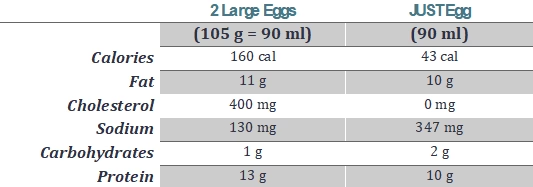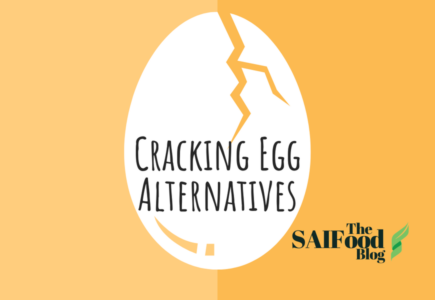It should be of no surprise that I am once again writing about an alternative protein product, this time, for eggs! Given that SAIFood stands for Sustainable Agricultural Foods and Innovation, it’s always fun to learn about new innovative foods that are available at our local markets.

One such product is Eat Just – a plant-based alternative to egg products. Founded in 2011, this California firm offers plant-based protein alternatives to egg products for those seeking such products. You may have seen it in the cooler section of your supermarket between the milk and eggs, but it’s easily missed; I have been eyeing it up for a good year, but my husband has never noticed it. That’s because it’s a simple and discreet yellow mustard-looking plastic container with a simple black logo of JUST egg.
Nothing is as simple as an egg
Eggs are common to nearly every culture, diet, and cuisine. As simple as an egg is, it is also very complex. So, before I go on to explain how cool an egg alternative is, let’s first address how important and amazing eggs are. For our poultry friend the chicken, her natural cycle regulates her schedule and our diets quite nicely. Every 24-27 hours, a laying hen naturally produces an egg, regardless of whether a rooster has made his rounds or not. If fertilized, the egg grows a baby chick but if not fertilized, that hen’s egg is a yolk. Now, there is no point in letting that yolk go to waste; it is packed full of healthy fats, protein, macronutrients, and it’s also delicious! On the production side, a lot of work also goes into ensuring that the birds and their eggs are healthy and safe. It’s a highly regulated and costly around-the-clock industry. So, to those who help to keep our egg supply boundless and safe: thanks!
It’s not Just Eggs
So, what is this plant-based alternative? The firm Eat Just, is possibly most known for its JUST Egg product to replace your scrambled eggs. Of course, it doesn’t contain any egg or animal products, it is an emulsification of mung bean (its protein isolate), canola oil, water, and a handful of other ingredients that make up less than 2% of its content. The only difference in preparing your scrambled egg is the difference between cracking an egg or cracking open the lid to pour it out. Pretty simple. But how does it stack up to a real egg?
When you compare the nutrition of JUST Eggs to two large eggs, they are fairly comparable as shown in Table 1. In general, JUST Eggs have fewer calories, fats and cholesterol; a regular egg has less sodium and carbohydrates, and more protein. Given what a small percentage these values represent of the average daily recommended values of an average diet, I don’t think we can fault one over the other for their slight differences. In terms of the benefits of one over the other, it comes down to what you want or need in your diet. The plant-based product is advertised as non-GMO and has no artificial flavours. That’s nice; it puts JUST Egg on a level playing ground with a good old egg, which can stake the same claims. For those who are seeking to reduce their choleric intake, have an egg allergy/sensitivity, or are looking for a non-animal product, JUST Eggs is a nice option to have.
Table 1: Nutritional comparison of eggs and JUST Egg

https://www.ju.st/eat/just-egg
An alternative worth having
Why do we need an egg alternative in the first place? Most simply, not everyone eats (or can eat) animal products, as is the case for the population that have egg allergies or sensitivities. Johns Hopkins All Children’s Hospital estimates that roughly 2% of children are allergic to eggs. While it is reported that many can outgrow this allergy or have reduced reactions over time, knowing how prevalent eggs are in our food, as a parent this is a hard ingredient to avoid.[1] So having an alternative to eggs for this demographic is necessary, and it’s nice that these individuals have a choice to replace eggs while others, like myself, continue to have access to them. It’s a win-win, in my opinion.
Depending on what form of egg you are trying to replace, there are already a handful of egg alternatives available. In baking, egg yolks are used for binding, leavening, moisture, and flavour. Alternatives used for these various purposes can be swapping an egg for a mashed banana/avocado or apple sauce, or an egg replacer made from a mixture of plant-based starches like tofu or aquafaba. The Eat Just scrambled egg liquid can be used for baking but has some limitations in producing “light, airy cakes and meringues”. To better use their egg alternative products, they have a list of recipes online for all sorts of meals.
The advantages of having an egg alternative
It can’t hurt to have options and alternatives in life. It could be viewed as a product that is supportive of the need for eggs. Think about it, eggs are so prevalent in many of our cultures and foods, and we have been eating them for thousands of years. For those who can’t or don’t wish to eat eggs from poultry, they likely still need an egg replacer for many of their foods. It’s not likely that egg alternatives are going to replace the egg-producing market. From 2010 to 2020, Canada saw egg production grow from 634 to 839 million dozen eggs there is a huge demand for eggs in this country[2]. While it’s not likely that overnight or in the coming years we will see eggs on their way out, in 2021 the market research company Expert Market Research projected that vegan egg substitutes could grow as much as 5.6% a year between 2021 and 2026 globally.
What if something were to happen to our egg supply? Shouldn’t we have a backup in case of the threat of animal diseases? Like the flu in humans, poultry is susceptible to avian influenza (H5N1). When a flock is hit with the bird flu, that flock sadly needs to be destroyed to reduce the spread further. As of October 26th of this year, an estimated 3.2 million birds in flocks were impacted. While no evidence exists that cooked eggs transmit the flu to humans the industry safety precautions in place to protect flocks from H5N1 can dramatically hurt our egg production. In this case, as a highly demanded ingredient and source of protein, having an alternative can only be a benefit for us.
Lastly, and maybe more obvious to me as an agricultural economist, is that an alternative like Just Eggs is made with crop ingredients. It supports crop development. And while we are not known for being a mung bean-producing region in Western Canada, it doesn’t mean we couldn’t be. This pulse crop was making headlines a decade ago as being a potential crop for Western Canada. And according to Tridge, the dry mung bean export market grew to USD $2.03 billion in 2021, and growth from the $1.2 to $1.8 billion range the five years previous. This isn’t taking into consideration the value if we were to process the mung beans into the value-added protein isolate used in JUST Eggs.
Opportunities for local development
Whether you are on the fence about trying a plant-based egg alternative or even calling these alternatives ‘eggs’, it is clear that there is both a need for them and an opportunity. The Canadian firm Nabati Foods which is already in the alternative egg space, they are hoping in the future to switch to more local processing, rather than its past reliance on raw pea processing in China. Knowing there is a market globally growing for such alternative products, wouldn’t it be great to see our local producers, processors, and researchers are the ones to fill this growing demand? I hope that in the future, I see a Canadian flag on these products, showing that we have been made with Canadian ingredients and processed here in Canada. It would be fantastic to see that there has been an investment made into processing our local pulse crops into value-added products, rather than shipping them out raw for others to send back as a finished product.
[1] All food allergies are difficult to deal with and require much education and work in order to avoid the foods that trigger a reaction.
[2] In 2020, egg production would equal an egg for every Canadian from Monday through Friday, every week of the year.


